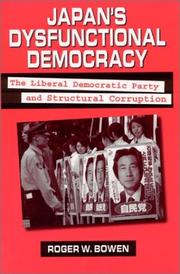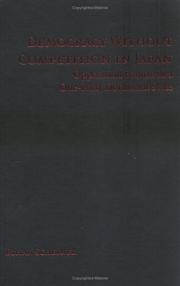| Listing 1 - 9 of 9 |
Sort by
|

ISBN: 1134193173 128037702X 9786610377022 0203099818 9780203099810 0415372410 9780415372411 9781134193172 9781134193127 1134193122 9781134193165 1134193165 9780415654418 0415654416 6610377022 Year: 2005 Publisher: London New York, N.Y. Routledge
Abstract | Keywords | Export | Availability | Bookmark
 Loading...
Loading...Choose an application
- Reference Manager
- EndNote
- RefWorks (Direct export to RefWorks)
Examines the impact the 1993 general election had on Japanese politics. Although the Liberal Democratic Party (LDP) regained the position of a ruling party within a year, the author questions whether the Japanese political system has managed to maintain the same efficacy as it had prior to 1993.
Fiscal policy --- Jiyū Minshutō. --- Japan. --- MOF --- Japana. --- M.O.F. --- 日本. --- Jiyūtō (1950-1955) --- Nihon Minshutō --- Jimintō (Japan) --- Jiyūminshutō (Japan) --- Liberal Democratic Party (Japan) --- Liberalʹno-demokraticheskai︠a︡ partii︠a︡ I︠A︡ponii --- Liberalʹno-demokraticheskai︠a︡ partii︠a︡ (Japan) --- LDP --- Tzu yu min chu tang (Japan) --- 自由民主党 --- 自由民主黨 --- Partido Liberal Demócrata (Japan) --- PLD --- Japan --- Politics and government --- Economic policy. --- Jiyu Minshuto.
Book
ISBN: 9780367149239 9780429053931 1032238542 9781032238548 Year: 2020 Publisher: London Routledge, Taylor & Francis Group
Abstract | Keywords | Export | Availability | Bookmark
 Loading...
Loading...Choose an application
- Reference Manager
- EndNote
- RefWorks (Direct export to RefWorks)
Political parties --- Japan --- Jiyū Minshutō --- Jimintō (Japan) --- Jiyūminshutō (Japan) --- Liberal Democratic Party (Japan) --- Liberalʹno-demokraticheskai︠a︡ partii︠a︡ I︠A︡ponii --- Liberalʹno-demokraticheskai︠a︡ partii︠a︡ (Japan) --- LDP --- Tzu yu min chu tang (Japan) --- 自由民主党 --- 自由民主黨 --- Partido Liberal Demócrata (Japan) --- PLD --- Jiyūtō (1950-1955) --- Nihon Minshutō --- History. --- Politics and government --- J4655 --- Japan: Politics and law -- central government -- political parties

ISBN: 1920942335 0731537572 9780731537570 9781920942335 Year: 2006 Publisher: Canberra, Australia : ANU E Press,
Abstract | Keywords | Export | Availability | Bookmark
 Loading...
Loading...Choose an application
- Reference Manager
- EndNote
- RefWorks (Direct export to RefWorks)
"Power and Pork: a Japanese Political Life aims to tell the 'inside story' of a Japanese politician - Matsuoka Toshikatsu - one of the more controversial members of Japan's national Diet. The book details Matsuoka's political stratagems and policy activities as an archetypal 'traditional' politician representing farm and rural interests." "The scope of the work is contemporary Japanese domestic politics, including electoral processes, zoku influence, pork barrelling and 'money politics' as exemplified by one of its key players. Power and Pork gives an account of how Matsuoka has catered to local, sectional and clientele interests in order to build and retain his political power base. One of the most important conclusions of the book is that individual
Political corruption --- Political ethics --- Politicians --- Regions & Countries - Asia & the Middle East --- History & Archaeology --- East Asia --- Matsuoka, Toshikatsu, --- Japan --- Politics and government --- 松岡利勝, --- Jiyū Minshutō --- Corrupt practices. --- Jimintō (Japan) --- Jiyūminshutō (Japan) --- Liberal Democratic Party (Japan) --- Liberalʹno-demokraticheskai︠a︡ partii︠a︡ I︠A︡ponii --- Liberalʹno-demokraticheskai︠a︡ partii︠a︡ (Japan) --- LDP --- Tzu yu min chu tang (Japan) --- 自由民主党 --- 自由民主黨 --- Partido Liberal Demócrata (Japan) --- PLD --- Jiyūtō (1950-1955) --- Nihon Minshutō
Book
ISBN: 0691619425 0691000166 1400871417 0691646325 0691030294 1322885494 9781322885490 9781400871414 9780691030296 Year: 2015 Publisher: Princeton, NJ
Abstract | Keywords | Export | Availability | Bookmark
 Loading...
Loading...Choose an application
- Reference Manager
- EndNote
- RefWorks (Direct export to RefWorks)
Dr. Thayer, who was American press attaché in Tokyo from 1962 to 1965, presents a detailed account of conservative politics in Japan. Although he makes some historical comparisons, Dr. Thayer's main focus is on the contemporary workings of the Liberal Democratic Party, the ruling party in Japan. He identifies the political elements: the men are the Dietmen, the bureaucrats, the businessmen, the regional politicians, and the people; the institutions are the factions, the regional organizations of the Dietmen, the economic community and the various party organs. He shows how these elements work: how the Prime Minister is elected, how the cabinet is chosen, how party and government posts are filled, how policy is made, how a political decision is reached, and how the party is run.Contents: I. Introduction.; II. The Factions.; III. The Economic Community.; IV. The Party, the Prefectures, and the People.; V. The Elections.; VI. Choosing the President.; VII. Making a Cabinet.; VIII. Formulating Policy.; IX. Reaching a Decision.; X. Running the Party.; XI. Conclusions.; Index.Originally published in 1969.The Princeton Legacy Library uses the latest print-on-demand technology to again make available previously out-of-print books from the distinguished backlist of Princeton University Press. These editions preserve the original texts of these important books while presenting them in durable paperback and hardcover editions. The goal of the Princeton Legacy Library is to vastly increase access to the rich scholarly heritage found in the thousands of books published by Princeton University Press since its founding in 1905.
Japan -- Politics and government -- 1945-. --- Jiyū Minshutō. --- Japan --- Politics and government --- Jimintō (Japan) --- Jiyūminshutō (Japan) --- Liberal Democratic Party (Japan) --- Liberalʹno-demokraticheskai︠a︡ partii︠a︡ I︠A︡ponii --- Liberalʹno-demokraticheskai︠a︡ partii︠a︡ (Japan) --- LDP --- Tzu yu min chu tang (Japan) --- 自由民主党 --- 自由民主黨 --- Partido Liberal Demócrata (Japan) --- PLD --- Jiyūtō (1950-1955) --- Nihon Minshutō --- 328 <520> --- #SBIB:328H53 --- 328 <520> Parlement. Volksvertegenwoordiging. Regering en parlement--Japan --- Parlement. Volksvertegenwoordiging. Regering en parlement--Japan --- Instellingen en beleid: Japan --- HISTORY / Asia / Japan.
Book
ISBN: 0801460026 9780801460029 9780801449321 0801449324 9780801476822 0801476828 9780801459733 Year: 2011 Publisher: Ithaca, NY
Abstract | Keywords | Export | Availability | Bookmark
 Loading...
Loading...Choose an application
- Reference Manager
- EndNote
- RefWorks (Direct export to RefWorks)
After holding power continuously from its inception in 1955 (with the exception of a ten-month hiatus in 1993-1994), Japan's Liberal Democratic Party (LDP) lost control of the national government decisively in September 2009. Despite its defeat, the LDP remains the most successful political party in a democracy in the post-World War II period. In The Rise and Fall of Japan's LDP, Ellis S. Krauss and Robert J. Pekkanen shed light on the puzzle of the LDP's long dominance and abrupt defeat. Several questions about institutional change in party politics are at the core of their investigation: What incentives do different electoral systems provide? How do politicians adapt to new incentives? How much does structure determine behavior, and how much opportunity does structure give politicians to influence outcomes? How adaptable are established political organizations? The electoral system Japan established in 1955 resulted in a half-century of "one-party democracy." But as Krauss and Pekkanen detail, sweeping political reforms in 1994 changed voting rules and other key elements of the electoral system. Both the LDP and its adversaries had to adapt to a new system that gave citizens two votes: one for a party and one for a candidate. Under the leadership of the charismatic Koizumi Junichiro, the LDP managed to maintain its majority in the Japanese Diet, but his successors lost popular support as opposing parties learned how to operate in the new electoral environment. Drawing on the insights of historical institutionalism, Krauss and Pekkanen explain how Japanese politics functioned before and after the 1994 reform and why the persistence of party institutions (factions, PARC, koenkai) and the transformed role of party leadership contributed both to the LDP's success at remaining in power for fifteen years after the reforms and to its eventual downfall. In an epilogue, the authors assess the LDP's prospects in the near and medium term.
Political Science & Political History. --- POLITICAL SCIENCE / Political Process / Political Parties. --- Jiyū Minshut --- History. --- Japan --- Politics and government --- Jiyū Minshutō --- Jimintō (Japan) --- Jiyūminshutō (Japan) --- Liberal Democratic Party (Japan) --- Liberalʹno-demokraticheskai︠a︡ partii︠a︡ I︠A︡ponii --- Liberalʹno-demokraticheskai︠a︡ partii︠a︡ (Japan) --- LDP --- Tzu yu min chu tang (Japan) --- 自由民主党 --- 自由民主黨 --- Partido Liberal Demócrata (Japan) --- PLD --- Jiyūtō (1950-1955) --- Nihon Minshutō --- History --- Japon --- Politique et gouvernement

ISBN: 1315290324 1315290332 1315290316 9781315290324 9781315290317 0765611023 9781315290331 9781315290300 9780765611024 9780765611031 Year: 2016 Publisher: Taylor and Francis
Abstract | Keywords | Export | Availability | Bookmark
 Loading...
Loading...Choose an application
- Reference Manager
- EndNote
- RefWorks (Direct export to RefWorks)
Democracy --- Political parties --- Jiyū Minshutō. --- Jiyūtō (1950-1955) --- Nihon Minshutō --- Jimintō (Japan) --- Jiyūminshutō (Japan) --- Liberal Democratic Party (Japan) --- Liberalʹno-demokraticheskai︠a︡ partii︠a︡ I︠A︡ponii --- Liberalʹno-demokraticheskai︠a︡ partii︠a︡ (Japan) --- LDP --- Tzu yu min chu tang (Japan) --- 自由民主党 --- 自由民主黨 --- Partido Liberal Demócrata (Japan) --- PLD --- Japan --- Politics and government --- J4239 --- J4601 --- J4610 --- J4654 --- J4655 --- Japan: Sociology and anthropology -- social pathology -- corruption (general) --- Japan: Politics and law -- policy, legislation, guidelines, codes of behavior --- Japan: Politics and law -- theory, methodology and philosophy --- Japan: Politics and law -- central government -- electoral system --- Japan: Politics and law -- central government -- political parties

ISBN: 0415372410 9780415372411 Year: 2006 Publisher: London Routledge
Abstract | Keywords | Export | Availability | Bookmark
 Loading...
Loading...Choose an application
- Reference Manager
- EndNote
- RefWorks (Direct export to RefWorks)
Fiscal policy --- Politique fiscale --- Japan. --- Jiyū Minshutō. --- Japan --- Japon --- Politics and government --- Economic policy. --- Politique et gouvernement --- Politique économique --- J4640 --- J4655 --- J4645.30 --- Japan: Politics and law -- central government --- Japan: Politics and law -- central government -- political parties --- Japan: Politics and law -- central government -- ministries and departments related to finance --- J4600.90 --- Japan: Politics and law -- history -- postwar Shōwa (1945- ), Heisei period (1989- ), contemporary --- Jimintō (Japan) --- Jiyūminshutō (Japan) --- Liberal Democratic Party (Japan) --- Liberalʹno-demokraticheskai︠a︡ partii︠a︡ I︠A︡ponii --- Liberalʹno-demokraticheskai︠a︡ partii︠a︡ (Japan) --- LDP --- Tzu yu min chu tang (Japan) --- 自由民主党 --- 自由民主黨 --- Partido Liberal Demócrata (Japan) --- PLD --- Jiyūtō (1950-1955) --- Nihon Minshutō --- MOF --- Japana. --- M.O.F. --- 日本.
Book
ISBN: 607462254X 6076286822 Year: 2011 Publisher: El Colegio de México
Abstract | Keywords | Export | Availability | Bookmark
 Loading...
Loading...Choose an application
- Reference Manager
- EndNote
- RefWorks (Direct export to RefWorks)
Esta obra analiza las causas por las cuales el Partido Liberal Demócrata de Japón se escindió después de haber mantenido el poder y una solidez en su estructura a lo largo de 38 años. Asimismo, aporta un sugestivo análisis de la manera en que un sistema político se transforma a raíz de los cambios económicos internos y externos.
Political parties --- Partidos políticos --- Japan --- Politics and government-1945 --- -Japón --- Política y gobierno --- al-Yābān --- Giappone --- Government of Japan --- Iapōnia --- I︠A︡ponii︠a︡ --- Japam --- Japani --- Japão --- Japon --- Japonia --- Japonsko --- Japonya --- Jih-pen --- Mư̄ang Yīpun --- Nihon --- Nihon-koku --- Nihonkoku --- Nippon --- Nippon-koku --- Nipponkoku --- Prathēt Yīpun --- Riben --- State of Japan --- Yābān --- Yapan --- Yīpun --- Zhāpān --- Япония --- اليابان --- يابان --- 日本 --- 日本国 --- Japón --- Politics and government --- Jiyū Minshutō --- History --- Jimintō (Japan) --- Jiyūminshutō (Japan) --- Liberal Democratic Party (Japan) --- Liberalʹno-demokraticheskai︠a︡ partii︠a︡ I︠A︡ponii --- Liberalʹno-demokraticheskai︠a︡ partii︠a︡ (Japan) --- LDP --- Tzu yu min chu tang (Japan) --- 自由民主党 --- 自由民主黨 --- Partido Liberal Demócrata (Japan) --- PLD --- Jiyūtō (1950-1955) --- Nihon Minshutō --- Asian history --- Jepun --- Yapon --- Yapon Ulus --- I︠A︡pon --- Япон --- I︠A︡pon Uls --- Япон Улс

ISBN: 0521846927 0521609690 1107152569 9786611040093 0511334443 0511567812 0511610661 1281040096 0511333781 0511333102 0511335024 9780511335020 9780511334443 9780511610660 9780511333781 9781281040091 9780521846929 9780521609692 9780521846929 9780521609692 9781107152564 6611040099 9780511333101 9780511567810 Year: 2006 Publisher: Cambridge New York Cambridge University Press
Abstract | Keywords | Export | Availability | Bookmark
 Loading...
Loading...Choose an application
- Reference Manager
- EndNote
- RefWorks (Direct export to RefWorks)
Despite its democratic structure, Japan's government has been dominated by a single party, the Liberal Democratic Party (LDP) since 1955. This book offers an explanation for why, even in the face of great dissatisfaction with the LDP, no opposition party has been able to offer itself as a credible challenger in Japan. Understanding such failure is important for many reasons, from its effect on Japanese economic policy to its implications for what facilitates democratic responsiveness more broadly. The principal explanations for opposition failure in Japan focus on the country's culture and electoral system. This book offers a new interpretation, arguing that a far more plausible explanation rests on the predominance in Japan of clientelism, combined with a centralized government structure and electoral protection for groups that benefit from clientelism. While the central case in the book is Japan, the analysis is also comparative and applies the framework cross-nationally.
Democracy --- Political parties --- Patronage, Political --- Patron and client --- Démocratie --- Partis politiques --- Favoritisme --- Patron et client --- Jiyu Minshuto. --- Japan --- Japon --- Politics and government --- Politique et gouvernement --- J4655 --- J4610 --- -Jiyū Minshutō --- -Patronage, Political --- -Patron and client --- -Japan --- -Clientela --- Clientelism --- Patronage, Roman --- Political patronage --- Spoils system --- Civil service reform --- Parties, Political --- Party systems, Political --- Political party systems --- Political science --- Divided government --- Intra-party disagreements (Political parties) --- Political conventions --- Self-government --- Equality --- Representative government and representation --- Republics --- Japan: Politics and law -- central government -- political parties --- Japan: Politics and law -- theory, methodology and philosophy --- -J4655 --- -Japan: Politics and law -- central government -- political parties --- -Democracy --- Démocratie --- Jiyū Minshutō. --- Clientela --- Jimintō (Japan) --- Jiyūminshutō (Japan) --- Liberal Democratic Party (Japan) --- Liberalʹno-demokraticheskai︠a︡ partii︠a︡ I︠A︡ponii --- Liberalʹno-demokraticheskai︠a︡ partii︠a︡ (Japan) --- LDP --- Tzu yu min chu tang (Japan) --- 自由民主党 --- 自由民主黨 --- Partido Liberal Demócrata (Japan) --- PLD --- Jiyūtō (1950-1955) --- Nihon Minshutō --- Social Sciences --- Political Science --- Dominant-party systems. --- One-party dominant systems --- Clientelism, Political --- Patron-client politics --- Political clientelism --- Political sociology
| Listing 1 - 9 of 9 |
Sort by
|

 Search
Search Feedback
Feedback About UniCat
About UniCat  Help
Help News
News